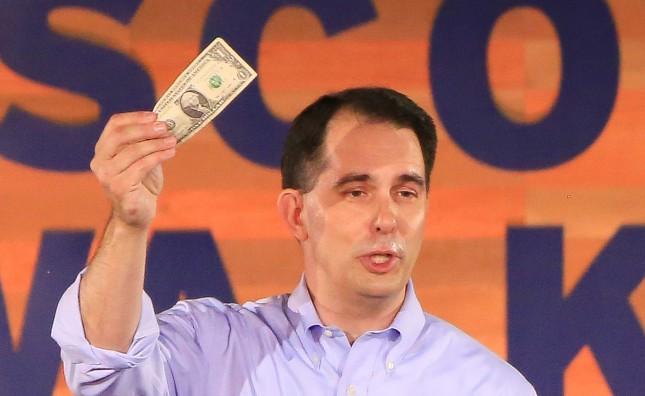1,500 pages — the length of the leaked John Doe documents.
Having read the entirety of these documents, I don’t see how the U.S. Supreme Court can justify this gross miscarriage of their judicial duties.
It doesn’t take someone well-versed in campaign finance to understand that the John Doe documents reek of finance coordination that can subvert the will of the people. It’s the top court’s job to determine if this sort of activity is legal or not.
For those not familiar with John Doe investigations, these are not based on probable cause, like a criminal investigation. An investigation can start from a hunch from a district attorney.
What prosecutors were trying to prove in this investigation was whether or not there was a possibility of collusion between Gov. Scott Walker and the issue advocacy group, supposedly independent from Walker, Wisconsin Club for Growth. Prosecutors wanted to see if instead of working on Walker’s behalf, Walker was calling the shots for the group.
And this appears to be what happened.
Two crucial members of Walker’s campaign were Kate Doner, founder of Doner Fundraising, and R.J. Johnson, the man in charge of WiCFG. In an email exchange between the two, Doner said, “As the Governor discussed with Mr. Pickens, he wants all the issue advocacy efforts run through one group to ensure correct messaging. We had some past problems with multiple groups doing work on ‘behalf’ of Gov. Walker, and it caused some issues. The Governor is encouraging all to invest in the Wisconsin Club for Growth.”
If the U.S. Supreme Court didn’t find this particular email revealing of the nature of the relationship between Walker, his campaign personnel and the WiCFG, they could look at the literal hundreds of emails between Walker’s staffers, outside fundraising firms and WiCFG.
More proof of this coordination comes in an email from Johnson to Walker and Keith Gilkes, who ran Walker’s recall campaign, where Johnson said, “The only way to succeed is as Reagan said trust but verify. Verification is we control the resources.” Resources, of course, are monetary donations.
The “resources” WiCFG controlled were not chump change. The usual campaign contribution limits Political Action Committees to $86,000 and individuals to $20,000 to a governor’s campaign. Limits on individuals to PACs and PACs to other PACs are nonexistent. This allowed for individuals such as John Menard to donate more money to Walker’s favorite PAC than I have earned in my life.
An interesting caveat is how this case came to the U.S. Supreme Court in the first place.
The judge overseeing the John Doe investigation halted this investigation in January 2014. The lead prosecutors on the case, District Attorney John Chisholm and self-described Republican special prosecutor Francis Schmitz, appealed this decision to the state Supreme Court. Their appeal was denied, so the prosecution appealed to the U.S. Supreme Court on the fitness of the judges, asserting that Prosser should have excused himself because of campaign contributions from WiCFG.
If you read all the documents, or even the Guardian article, there is a section referring to state Supreme Court Justice David Prosser. Prosser seems to have benefitted from WiCFG money in his tight Supreme Court race with Joanne Kloppenburg, where he narrowly won by a margin of 7,006 votes. Another state justice, Michael Gableman, received campaign contributions from the PAC as well.
One email from Brian Fraley, a conservative strategist, reads “David Prosser is in trouble. And if we lose him, the Walker agenda is toast, as could be the Senate GOP majority and any successes creating a new redistricted map. That’s not hyperbole, we need only to look at the last five weeks to see the left will stop at nothing. Law be damned.”
And because of this trouble, the PAC took control, as an email from Johnson said, “Club is leading the coalition to maintain the Court. Thus far I have raised $450 (thousand) and am looking to raise an additional $409 (thousand).”
Of the $3.5 million donated to Prosser’s campaign, $1.5 million came from WiCFG. As Walker said in an email to Karl Rove, former adviser to President George W. Bush, “Club for Growth – Wisconsin was the key to retaining Justice Prosser.”
So when Walker and his campaign finance buddies are under investigation, Prosser decides to rule in favor of WiCFG and Walker, halting the John Doe investigation.
Whether or not Prosser was swayed by these hefty donations is irrelevant to the blatant failure of the U.S. Supreme Court to not at least consider the possibility that he and Gableman were not acting on their best judgement. As Republican presidential nominee Donald Trump said in the first GOP debate, “I give to everybody, when they call I give, and you know what? When I need something from them, two years, three years later, I call, they are there for me.”
But according to the U.S. Supreme Court that only applies to politicians, not judges.
Aaron Reilly ([email protected]) is a sophomore majoring in social work and economics.














